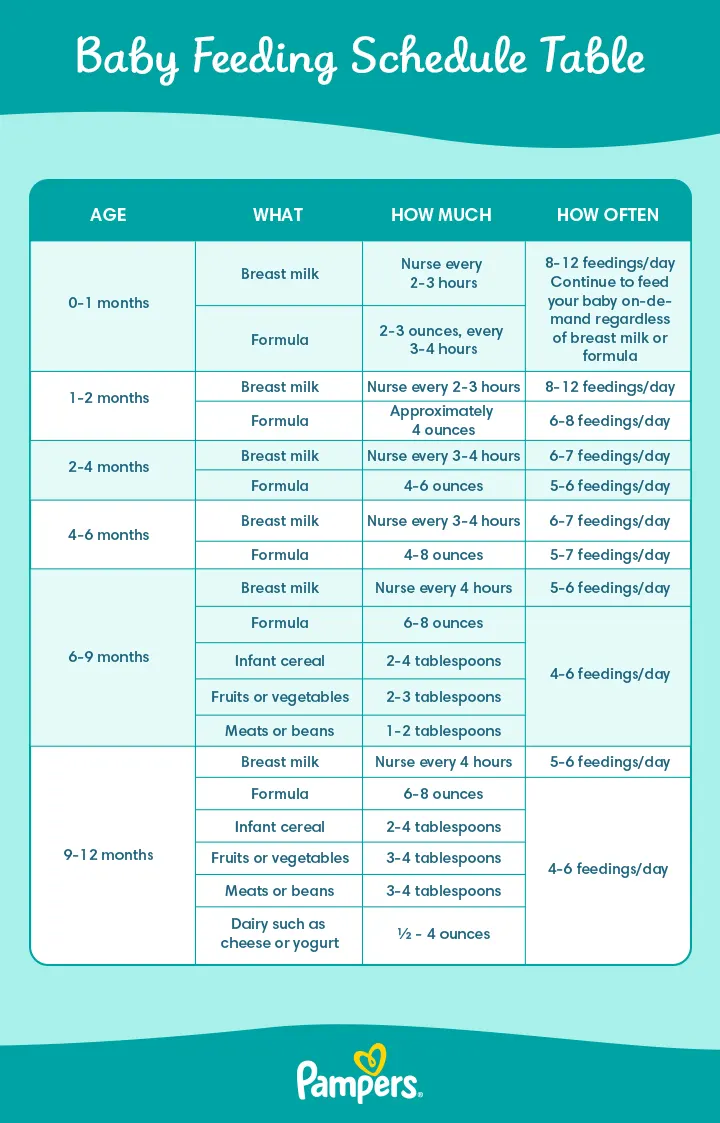Creating a feeding schedule for your newborn is essential. It helps ensure that your baby gets the proper nutrition needed for healthy growth and development. This article will provide a detailed breakdown of feeding schedules based on age, along with useful tips for parents. Whether you choose breastfeeding or formula feeding, knowing when and how much to feed your baby is crucial.
Feeding Newborns: Birth to 1 Month
In the first month, newborns typically have small stomachs. They need to eat often, about every 2 to 3 hours, including during the night. This frequent feeding helps establish a good supply of breast milk or formula. For breastfeeding mothers, it can be helpful to nurse on demand. This means feeding whenever your baby shows signs of hunger.
Would you like to see this content of ours How to Swaddle a Newborn Properly
Signs of Hunger in Newborns
Look for these signs that your newborn is hungry:
- Rooting reflex: turning their head and opening their mouth when touched on the cheek.
- Smacking lips or sucking on hands.
- Crying, which can be a late sign of hunger.
Pay attention to these cues. Feeding your baby when they are hungry helps them feel secure and ensures they get enough nourishment.
Feeding Schedule for Infants: 1 to 3 Months
At this stage, babies may start to develop a more predictable feeding routine. Most infants will still need to eat approximately every 3 hours, but some may start sleeping longer stretches at night. On average, babies will consume around 4 to 6 ounces per feeding if they are bottle-fed.
Breastfeeding vs. Formula Feeding
If you are breastfeeding, your body will respond to your baby’s needs. You might find that you are still nursing every 2 to 3 hours. Formula-fed infants might stick to a stricter schedule as they can usually go a bit longer between feedings. Ensure you are offering enough formula based on your baby’s weight and doctor’s advice.
Feeding Schedule: 3 to 6 Months
As babies reach three months, they often show signs of being ready for slightly longer intervals between feedings. Many infants will now eat every 4 hours during the day but may still wake at night for a feed. This is a normal pattern that varies from one baby to another.
Introducing Solid Foods
Around six months, most pediatricians recommend starting solid foods alongside continued breastfeeding or formula feeding. Begin with single-grain cereals or pureed fruits and vegetables. Start with small amounts, gradually increasing as your baby adjusts to the new textures.
- Introduce one new food at a time and wait three days before adding another. This helps identify any allergies.
- Continue with breast milk or formula as the main source of nutrition until at least one year old.
Feeding Schedule: 6 to 9 Months
By six months, babies often eat solids two or three times a day while still having regular breast milk or formula feeds. A typical schedule might look like this:
- Breakfast: Solid food (e.g., oatmeal) + breast milk/formula.
- Lunch: Pureed vegetables + breast milk/formula.
- Dinner: Pureed fruits + breast milk/formula.
This balance gives babies essential nutrients while encouraging them to explore different flavors and textures.
Understanding Your Baby’s Preferences
Your baby might show preferences for certain foods. Keep trying different options even if they initially reject them. It can take several tries before a baby accepts a new food. Always ensure that foods are cooked well and cut into appropriate sizes to prevent choking hazards.
Feeding Schedule: 9 to 12 Months
At nine months, many babies are ready for more variety in their meals and might be eating three meals a day plus snacks. They may also be able to handle more textured foods such as mashed fruits and soft pieces of vegetables or meats.
Encouraging Self-Feeding
This is an excellent time to encourage self-feeding skills. Offer small pieces of soft foods that they can pick up with their fingers. Baby-led weaning is popular among many parents during this stage, allowing babies to choose what they want to eat from safe options on their plate.
Monitoring Your Baby’s Growth
No matter what age your baby is, monitoring growth is vital. Regular check-ups with the pediatrician help track their weight and development milestones. If you have concerns about feeding amounts or growth patterns, reach out to your doctor for guidance.
Signs Your Baby Is Full
Just as it’s important to recognize when your baby is hungry, knowing when they are full is equally essential:
- Pushing away food or turning their head away from the spoon.
- Zoning out or becoming disinterested in eating.
- Crying after being offered more food.
Tips for Successful Feeding Across All Ages
No matter their age, here are some helpful tips for developing good feeding habits:
- Create a calm environment during meals; avoid distractions like TVs or loud noises.
- Be patient and offer new foods multiple times without pressure.
- Avoid forcing them to finish everything on their plate; listen to their cues instead.
The Role of Hydration in Feeding
This article has focused primarily on food intake, but hydration is crucial too. As babies grow older and start eating solids, they will also need water introduced into their diet around six months of age. Offer small sips of water during meals or between feeds while continuing breast milk or formula as the primary source of hydration until one year old.
Avoiding Common Mistakes in Feeding Schedules
Parents can sometimes make common mistakes in feeding schedules:
- Ignoring hunger cues can lead to overfeeding or underfeeding.
- Rushing into solid foods too early before your baby is ready can cause digestive issues.
- Not balancing breast milk/formula with solid foods appropriately may lead to nutrient deficiencies.
The Importance of Consistency in Feeding Schedules
A consistent feeding schedule helps regulate your baby’s internal clock regarding hunger and sleep patterns. Try keeping meal times around the same time each day; this routine provides comfort and predictability for your child as they grow up.
Conclusion
A newborn feeding schedule by age is essential for ensuring proper nutrition and development in infants. From birth through the first year, feeding needs change significantly as babies grow and develop new skills. By paying attention to their cues and adjusting accordingly, parents can help foster healthy eating habits that last a lifetime. Remember that each baby is unique; what works for one might not work for another. Always consult with healthcare providers if you have any concerns about your baby’s growth or feeding habits.
Frequently Asked Questions
How often should I feed my newborn?
You should feed your newborn every 2-3 hours in the early weeks, including during the night, based on hunger cues from the baby.
When can I introduce solid foods?
You can typically start introducing solid foods around six months old while continuing breastfeeding or formula feeding as the main source of nutrition until at least one year old.
What if my baby refuses certain foods?
If your baby refuses certain foods, try offering them again later without pressure. It may take several attempts before they accept new flavors and textures.
How do I know if my baby is getting enough milk/formula?
Your pediatrician will monitor weight gain during check-ups, but signs include regular wet diapers (about 6-8 per day) and contentment after feedings.
Aren’t all babies different in their feeding patterns?
Yes, every baby has unique needs and preferences regarding feeding patterns; it’s essential to adapt schedules based on what works best for you and your child.
This article provides detailed information about newborn feeding schedules by age while maintaining clarity and compliance with SEO guidelines.

